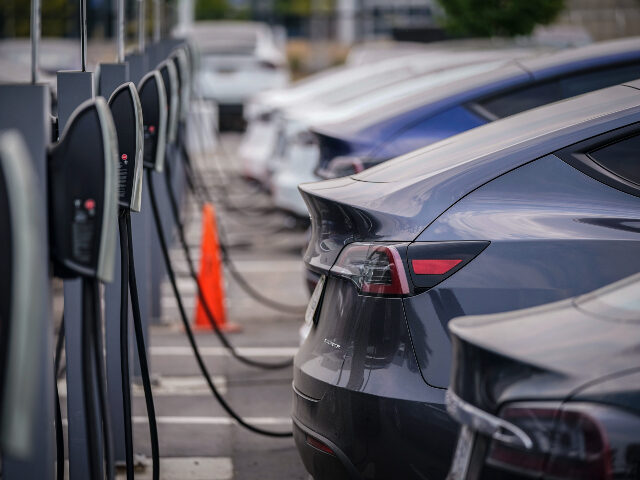Taiwanese Defense Minister Chiu Kuo-cheng told the legislature on Tuesday that the military will no longer purchase Tesla automobiles after CEO Elon Musk’s comments over the weekend supporting a Chinese takeover of the country.
Musk gave an interview to the Financial Times on Friday during which he held forth on various geopolitical issues, including what he viewed as an “inevitable” military conflict over Taiwan. Musk suggested this conflict could be averted if China made Taiwan a sufficiently attractive offer for colonization.
“My recommendation … would be to figure out a special administrative zone for Taiwan that is reasonably palatable, probably won’t make everyone happy. And it’s possible, and I think probably, in fact, that they could have an arrangement that’s more lenient than Hong Kong,” he said.
Musk’s Financial Times interviewer, Roula Khalaf, immediately sensed this facile proposal, possibly advanced out of “an arrogant belief that he has all the answers,” would not go over well in Taiwan.
Khalaf was correct in this assessment. Taiwan’s Mainland Affairs Council (MAC) responded by saying “neither Taiwan nor any other country would accept Musk’s proposal, which is based solely on corporate investment interests.”
“Taiwan occupies a key position in regional democratic politics and the global technology economy. It is not the product of any commercial transaction or acquisition, and it has long rejected any institutional arrangements of the Communist Party of China,” the MAC said.
Taiwan’s de facto ambassador to the United States, Bi-khim Hsiao, offered a similar response to Musk:
Musk may not have been fully aware of it, but Taiwan has been paying very close attention to the utter annihilation of civil rights in Hong Kong after the imposition of an authoritarian “national security law” in 2020.
The law crushed the huge pro-democracy movement of 2019 by effectively criminalizing all dissent as treason or collusion with foreign powers. It also turned legislative elections into a sham by permitting only Chinese Communist Party-approved “patriots” to run for office. Hong Kong voters have no control over the executive branch at all.
It was not lost on Taiwanese observers that Hong Kong’s legislature was completely bypassed when Beijing imposed the law, making an utter mockery of China’s promises to respect Hong Kong’s “limited autonomy” when it took control of the island from the United Kingdom in 1996.
The U.K. has declared China to be in a “state of ongoing non-compliance” with the Sino-British Joint Declaration treaty, and U.N. human rights experts have urged Hong Kong’s government to repeal the law. On Tuesday, the U.N. Human Rights Commission said it was “alarmed” by harsh jail sentences imposed on minors under the national security law.
Despite this ongoing torrent of criticism from around the world, the national security law remains in place, although Beijng’s puppet chief executive John Lee announced this week that plans to ladle even more authoritarian regulations on top of the China-imposed law have been put on hold until the end of the year.
It would be hard to imagine a more sobering lesson in how little China’s promises of “autonomy” and “special administrative zones” are worth. Support for the type of arrangement Musk suggested dropped considerably after the crackdown on Hong Kong.
A senior Taiwanese official made this point explicitly to the Taipei Times, suggesting Musk find a “clear-headed political adviser” before making any further pronouncements on Taiwan’s future.
“The world has seen clearly what happened to Hong Kong. Hong Kong’s economic and social vibrancy abruptly ended under Beijing’s totalitarian rule,” the official said.
Defense Minister Chiu said at Tuesday’s legislative session that Taiwan’s military “will definitely not make any more purchases” from Tesla.
“The procurement of equipment must be in accordance with the needs of the army and in line with government policy guidance. The national army currently has no need to purchase additional Tesla vehicles,” Chiu said.
As Taiwan News pointed out, Taiwan’s military presently owns only seven Tesla electric vehicles. The cars are used for “regular administrative affairs” and their eight onboard cameras are disabled for security reasons. According to Chiu, the military plans to acquire more electric vehicles to support government environmental policies, but will not buy them from Tesla.
Some Taiwanese were sufficiently incensed by Musk’s comments to demand a larger boycott of Tesla automobiles, which have been selling fairly well in Taiwan.
Mark Ho, a lawmaker from the governing Democratic Progressive Party (DPP), said at the Wednesday session that Musk’s comments made him “lose faith in Tesla,” and suggested other branches of the Taiwanese government might stop buying cars from Musk’s company.
Another DPP legislator, Chao Tien-lin, called for an “indefinite” boycott of Teslas until Musk retracted his comments – not just in Taiwan, but in allied democracies around the world.
“Individual independent companies cannot take their ownership as a joke. So why should they casually pass off the democratic freedoms, sovereignty and way of life of 23 million Taiwanese? It is not acceptable for Ukraine, and Taiwan certainly will not allow it,” declared DPP legislator Wang Ting-yu in a fiery Facebook post.
Chen Chi-mai, the mayor of Kaoshiung, truculently suggested Musk try handing control of his company over to the Chinese Communist Party and “see if it works.”
“Then he will understand why his recommendation won’t work with Taiwan,” Chen said.
Focus Taiwan reported on Tuesday that members of the Kuomintang opposition party also “blasted” Musk for his remarks, accusing him of making his suggestions “based on considerations of his own financial interests in China and to please Beijing.”
“Elon Musk’s opinion means ‘one country two systems.’ I cannot accept this,” said Ma Ying-jeou, a former Taiwanese president from the Kuomintang party who was born in Hong Kong.

COMMENTS
Please let us know if you're having issues with commenting.